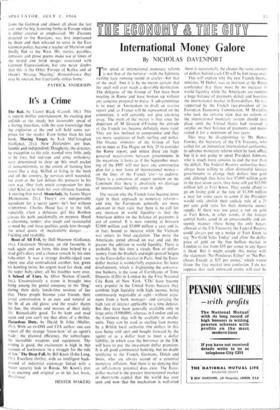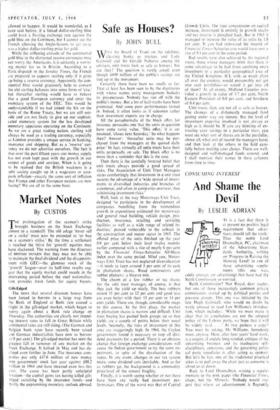International Money Galore Eculamr '111 001 -1 V
By NICHOLAS DAVENPORT
rrife speed of international monetary reform
I is not that of the tortoise—with the lightning sterling hare running round in circles—but that of the snail. And it is by no means certain that the snail will ever reach a desirable destination. The delegates of the Group of Ten have been meeting in Rome and have broken up without any concrete proposal to make. A sub-committee is to meet in Amsterdam to draft an evasive report and. as France will be represented on the committee: it will certainly not give anything away. The truth of the matter is that since the departure of M Giscard d'Estaing the attitude of the French has become definitely more rigid. They are less inclined to compromise and they are more suspicious of both sterling and dollar. The finance ministers of the Group of Ten are to meet at The Hague on July 25 to consider the Rome report. and unless there are high- powered negotiations between governments in the meantime it looks as if the September meet- ing of the IMF will not have any constructive plan for a new form of international money— on the lines of the French `cru'—to endorse. There is a consensus of expert opinion on the Continent that there is absolutely no shortage of international liquidity even in sight.
The reason why the French have become more rigid in their approach to monetary reform— and why the Europeans generally are more adamant in their view that there is no call for any increase in world liquidity—is that the American deficit on the balance of payments is out of control. It is now running at between $2,000 million and $3.000 million a year and is, in fact, bound to increase while the Vietnam war enters its final escalation. The more the Americans spend abroad on war and aid, the greater the addition to world liquidity. There is probably by this time a steady flow of dollar- money from the brothels and night spots of Saigon to the Euro-dollar market in Paris. And the Euro- dollar market is wonderfully expansive. Its latest development, which is frightening the conserva- tive bankers, is the issue of Certificates of Time Deposits (CDs) in London by the First National City Bank of New York. 'CDs' have become very popular in the United States because they combine high liquidity with high income, being continuously negotiable at sight—without argu- ment from a bank manager—and carrying the high rate of interest applicable to a time deposit. But they have been generally available only in large units ($500,000), whereas in London and on the Continent they will be available in smaller units. They can be used as sterling loan money by a British local authority (the dollars in this case being sold spot and bought forward by the agent) or as a dollar loan to meet a dollar liability, in which case the borrower in the UK will have to pay the investment dollar premium. It is all good commercial banking, but no doubt terrifying to the French, Germans, Dutch and Swiss, who are always scared of a potential monetary inflation. And there is no denying that an inflationary potential does exist. The Euro- dollar market is the greatest international market in short-term capital that the world has ever seen and now that the mechanism is well-oiled there is occasionally the chance the same amount of dollars behind each CD will be lent twice over.
This will explain why the new French finance minister, M Debre, was so insistent at the Rome conference that there must be no increase in world liquidity while the Americans are running a huge balance of payments deficit and boosting the international market in Euro-dollars. He supported by the French vice-president of the European Economic Commission, M Marjolin, who took the extreme view that no reform of the international monetary system should take place until the United States had restored a surplus on their balance of payments and main- tained it for a minimum of two years.
This may be disappointing to Mr Henry Fowler, the Secretary of the US Treasury, who called for an immediate international conference to advance monetary reform when he took office, but it is not going to upset President Johnson, who is much more anxious to end the war than the deficit. The Federal Reserve authorities have always been willing to allow distrustful foreign governments to change their dollars into gold and, although they have lost $7,000 million gold in the past seven years, they have still got $13,500 million left at Fort Knox. They could afford to go on losing gold at the rate of $1,300 million a year for some years to come if the President would only abolish their archaic rule of a 2:S per cent gold ratio for their domestic money supply. If there was too great a run on gold at Fort Knox, in other words, if the foreign central banks acted in an unreasonable and un- seemly manner (these being the only buyers allowed at the US Treasury), the Federal Reserve could always put up a notice at Fort Knox to say 'No Gold Sales Today' and allow the dollar price of gold on the free bullion market in London to rise from $35 per ounce to any figure it liked. But it might couple this notice with the statement 'No Purchases Either' or 'No Pur- chases Except at $25 per ounce,' which would throw the free market into confusion. I do not suppose that such untoward events will ever be allowed to happen. It would be wonderful, as I have said before, if a linked dollar-sterling bloc could have a floating exchange rate against the gold bloc on the Continent, but I cannot see the French allowing the Anglo-Saxons to get away was a higher dollar-sterling price for gold.
While the stiffening attitude of the continental gold bloc to the distrusted reserve currencies may not worry the Americans, it is certainly a worry- ing matter for us in Britain. According to a Paris dispatch in the Sunday Times, the French are prepared to support sterling only if it gives up being a reserve currency. Apparently the con- tinental bloc would graciously help to convert the old sterling balances into some form of `cru,' but thereafter sterling would have to behave like a good European currency and enter the monetary system of the EEC. This would be understandable if we had joined the Six on the basis of the Rome Treaty, but we are still out- side and are not likely to give up our sophisti- cated monetary system for the less developed monetary apparatus operating on the Continent. As we are a great trading nation, sterling will always be used as a trading currency, especially as London provides a unique service in banking, insurance and shipping. But as a 'reserve' cur- rency we do not advertise ourselves. The fact is that over the past fifteen years our money supply has not even kept pace with the growth in our output of goods and services. When is it going to be realised that the British weakness is a split society caught up in a wage-cost or cost- push inflation—exactly the same sort of inflation that France and other European nations are now facing? We are all in the same boat.































 Previous page
Previous page